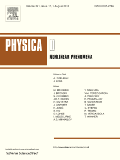
PHYSICA D-NONLINEAR PHENOMENA
Scope & Guideline
Exploring the Frontiers of Nonlinear Dynamics
Introduction
Aims and Scopes
- Nonlinear Dynamics:
The journal emphasizes the study of nonlinear dynamical systems, exploring their behaviors, stability, and chaotic dynamics through theoretical and computational approaches. - Soliton and Wave Phenomena:
A significant area of research involves solitons and wave dynamics, including their formation, stability, interactions, and applications in various physical contexts. - Complex Systems and Networks:
Investigations into complex systems, including network dynamics, synchronization phenomena, and collective behaviors of agents, are central to the journal's contributions. - Mathematical Modeling and Analysis:
The journal publishes papers that develop and analyze mathematical models across disciplines, focusing on their analytical solutions, numerical simulations, and implications for real-world systems. - Data-Driven Approaches:
There is a growing emphasis on integrating data-driven methods, such as machine learning and statistical inference, to analyze and predict the behaviors of nonlinear systems. - Applications in Physics and Beyond:
Research published in the journal spans various applications, including fluid dynamics, plasma physics, biological systems, and climate models, demonstrating the versatility of nonlinear phenomena.
Trending and Emerging
- Machine Learning and Data Science:
There is a marked increase in the application of machine learning techniques to analyze complex dynamical systems and to develop predictive models for nonlinear behaviors. - Multiscale and Complex Networks:
Research on multiscale interactions in complex networks is trending, highlighting the interplay between local dynamics and global network behaviors. - Nonlocal Effects and Fractional Dynamics:
Emerging interest in nonlocal interactions and fractional dynamics is evident, as researchers explore new mathematical frameworks to capture phenomena that traditional models cannot adequately describe. - Interdisciplinary Applications:
Papers reflecting interdisciplinary applications of nonlinear dynamics in fields such as biology, climate science, and social dynamics are on the rise, indicating a broader relevance of the journal's scope. - Stochastic Dynamics and Uncertainty Quantification:
Increasingly, researchers are focusing on stochastic models and uncertainty quantification methods to address the inherent unpredictability in complex systems. - Topological and Geometric Methods:
There is a growing interest in employing topological and geometric methods to analyze dynamical systems, revealing insights into stability and bifurcation phenomena.
Declining or Waning
- Classical Integrable Systems:
There has been a noticeable decline in publications focused on classical integrable systems, as researchers increasingly explore more complex and non-integrable dynamics. - Static Models of Dynamics:
Static or equilibrium models are becoming less common as the focus shifts towards dynamic, time-dependent models that capture the complexities of real-world systems. - Traditional Numerical Methods:
The reliance on conventional numerical methods appears to be waning, with a movement towards more sophisticated, adaptive, and data-driven techniques that enhance predictive capabilities. - Simple Chaotic Systems:
Research on simple chaotic systems is declining as the community increasingly investigates higher-dimensional, multi-scale, and coupled chaotic systems that reflect more realistic scenarios.
Similar Journals
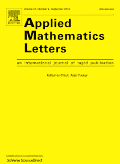
Applied Mathematics Letters
Unlocking Practical Solutions with Applied Mathematics InsightsApplied Mathematics Letters is a prestigious journal dedicated to the dissemination of significant research in the field of applied mathematics. Published by PERGAMON-ELSEVIER SCIENCE LTD in the United Kingdom, this journal serves as a vital resource for researchers, professionals, and students alike, aiming to bridge theoretical findings and practical applications. With an impressive impact factor placing it in the Q1 category and ranked 33 out of 635 in the Applied Mathematics category by Scopus, it showcases influential articles that contribute to advancements across various applications of mathematics. The journal's coverage from 1988 to 2025 ensures a rich archive of research that remains relevant and insightful for contemporary studies. Currently, it operates under a subscription-based model, providing access to cutting-edge research that forms the backbone of mathematical application in science and engineering. To become part of this dynamic community of scholars, readers are encouraged to explore the latest findings and ongoing discussions that highlight the interplay between mathematics and its real-world impacts.
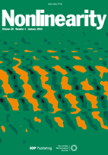
NONLINEARITY
Exploring the Depths of Complex SystemsNONLINEARITY is a premier academic journal published by IOP Publishing Ltd, dedicated to advancing the field of complex systems through the lens of nonlinear science. Since its inception in 1988, the journal has established itself as a vital resource for researchers and professionals alike, offering a robust platform for disseminating high-quality research in areas such as applied mathematics, mathematical physics, and statistical and nonlinear physics. With an impressive Q1 ranking across multiple pertinent categories, including Applied Mathematics and Mathematical Physics, NONLINEARITY ranks among the top journals globally, making it essential reading for those seeking to deepen their understanding of nonlinear phenomena. Although it does not operate under an open-access model, its rich repository of rigorous articles significantly contributes to academia, fostering innovative thought and facilitating cutting-edge research. Located in the heart of the United Kingdom at TEMPLE CIRCUS, TEMPLE WAY, BRISTOL BS1 6BE, NONLINEARITY continues to be at the forefront of the scientific community, championing new discoveries and interdisciplinary dialogue within its dynamic scope.
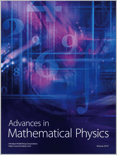
Advances in Mathematical Physics
Advancing Knowledge through Open AccessAdvances in Mathematical Physics is a premier open-access journal published by HINDAWI LTD, dedicated to the dissemination of research in the fields of applied mathematics and physics. With its ISSN 1687-9120 and E-ISSN 1687-9139, this journal has been a vital platform for innovative studies since its inception in 2009, fostering a collaborative environment for researchers and professionals alike. The journal features a wide range of topics, including but not limited to mathematical models, computational physics, and interdisciplinary applications, thus attracting a diverse readership. Ranked in the Q3 quartile for both Applied Mathematics and Physics and Astronomy, it serves as a significant resource for academics looking to explore cutting-edge developments and theoretical advancements. With an emphasis on open accessibility, Advances in Mathematical Physics ensures that research findings are readily available to the global academic community, leveling the playing field for emerging scholars and seasoned researchers. By consistently showcasing high-quality manuscripts, the journal contributes substantially to the fields of mathematics and physics, encouraging scholarly dialogue and advancing knowledge across a myriad of applications.

Complex Systems
Connecting Theories and Technologies in Complex SystemsComplex Systems is a pivotal journal published by Complex Systems Publications Inc, specializing in the interdisciplinary field of complex systems science. With an ISSN of 0891-2513, it focuses on advancing the understanding of complex phenomena across various domains, including computer science and control engineering. Operating from the United States, this journal has established itself as a credible source with a current impact factor reflecting its relevance—ranking in the Q3 category for both Computer Science (miscellaneous) and Control and Systems Engineering as of 2023. Although it does not offer Open Access, Complex Systems aims to facilitate the exchange of cutting-edge research and innovative methodologies, making it indispensable for researchers, professionals, and students eager to explore and contribute to the field. With coverage spanning from 2012 to 2024, it strives to foster a deeper understanding of the principles governing complex systems, thus paving the way for future technological advancements and theoretical developments.

REGULAR & CHAOTIC DYNAMICS
Exploring the Depths of Dynamical SystemsRegular & Chaotic Dynamics, published by PLEIADES PUBLISHING INC, is an esteemed journal that serves as a vital platform for disseminating cutting-edge research in the fields of applied mathematics, mathematical physics, and various interdisciplinary realms. With its ISSN 1560-3547 and E-ISSN 1468-4845, the journal features a diverse array of articles that delve into the dynamic systems and the intricacies of non-linear phenomena, offering insights invaluable to researchers and professionals alike. Since its launch in 1998, it has established itself as a significant resource, holding impressive rankings in Scopus that highlight its influence, including Q2 and Q3 quartile designations across multiple categories. While the journal is not open access, its rigorous peer-review process ensures high-quality publications that advance the discourse within the scientific community, making it an essential read for scholars dedicated to exploring the complexities of dynamical systems.

Nonlinear Phenomena in Complex Systems
Pioneering Research in Complex System DynamicsNonlinear Phenomena in Complex Systems, published by BELARUSSIAN STATE UNIV, JOINT INST POWER & NUCLEAR RESEARCH, is an emerging platform dedicated to advancing the understanding of nonlinear phenomena within complex systems. With an ISSN of 1561-4085 and an E-ISSN of 1817-2458, this journal serves as a vital resource for researchers spanning the fields of mathematical physics and statistical and nonlinear physics. While classified within the Q4 quartile for both disciplines as of 2023, we encourage authors to submit impactful research that addresses the intricacies and challenges presented by complex systems, which are pivotal in various scientific applications. Targeting an international audience, including researchers, professionals, and students, the journal aspires to foster collaboration and innovation by offering open access to its insightful articles. With a converged publication timeline from 2009 to 2024, Nonlinear Phenomena in Complex Systems is poised to become a significant contributor to the evolving dialogue around nonlinear dynamics and their implications across multiple scientific domains.

Nonlinear Dynamics Psychology and Life Sciences
Innovating the Study of Dynamic Systems and Human BehaviorNonlinear Dynamics Psychology and Life Sciences is a leading journal published by the SOC CHAOS THEORY PSYCHOLOGY & LIFE SCIENCES, focusing on the intersection of nonlinear dynamics and psychological phenomena as well as their implications in life sciences. With an ISSN of 1090-0578 and an E-ISSN of 1573-6652, this journal stands out as a reputable source of innovative research and analytical studies that contribute significantly to the fields of applied mathematics and psychology. By delving into the complex behaviors and patterns of dynamic systems, the journal addresses vital contemporary issues, making it essential reading for researchers, professionals, and students alike. Although it operates on a traditional access model, the journal's insights are invaluable for understanding the empirical background behind nonlinear dynamics in psychological research. Recognized within the academic community for its contributions, it holds a 2023 Scopus ranking of #436 out of 635 in the Applied Mathematics category, placing it in the 31st percentile, and it is designated as Q3 in its quartile categorization. As a bridge between theoretical foundations and real-world applications, Nonlinear Dynamics Psychology and Life Sciences aims to foster interdisciplinary dialogue and inspire future research in this exciting and evolving field.

Journal of Physics-Complexity
Unlocking the Secrets of Complex Systems for a Brighter FutureThe Journal of Physics-Complexity, published by IOP Publishing Ltd, is a premier open access journal that has been making significant strides in the fields of Artificial Intelligence, Computer Networks and Communications, Computer Science Applications, and Information Systems since its establishment in 2020. Operating from the United Kingdom, this journal aims to foster interdisciplinary research that bridges theoretical and applied aspects of complexity science. With an admirable Q2 ranking in four prestigious categories and a Scopus ranking indicating it holds a solid position within its fields, this journal caters to a diverse audience of researchers, professionals, and students eager to explore the intricacies of complex systems. Its open access model ensures that groundbreaking research is readily available to the global community, thereby enhancing the dissemination of knowledge and information. As it converges towards 2024, the Journal of Physics-Complexity is poised to expand its influence, inviting innovative contributions that challenge conventional thinking and push the boundaries of scientific discovery.
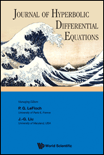
Journal of Hyperbolic Differential Equations
Fostering Excellence in Hyperbolic Differential ResearchJournal of Hyperbolic Differential Equations, published by World Scientific Publishing Co. Pte Ltd, is an esteemed platform dedicated to advancing the field of differential equations, particularly those characterized by hyperbolic behavior. With a strong focus on the intersection of analysis and mathematical application, this journal serves as a vital resource for researchers and practitioners alike. Established in 2004, it has made significant strides in the academic community, evidenced by its Q2 ranking in both categories of Analysis and Mathematics (Miscellaneous) in 2023. Although it does not operate under an open-access model, the journal remains committed to disseminating high-quality research that contributes to theoretical developments and practical applications in mathematics. Its evolving scope and rigorous peer-review process guarantee that only the most impactful studies are published, ensuring its relevance and utility for students, scholars, and professionals in the ever-evolving discipline of mathematics.
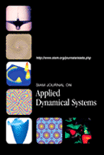
SIAM JOURNAL ON APPLIED DYNAMICAL SYSTEMS
Innovating Methodologies for Real-World Applications.SIAM Journal on Applied Dynamical Systems, published by SIAM Publications, stands as a premier platform for disseminating vital research in the fields of applied dynamical systems, analysis, and modeling and simulation. With a commendable impact factor reflecting its scholarly influence, this journal ranks in the Q1 category for both analysis and modeling/simulation in 2023, positioning it among the top resources in these disciplines. Enthusiastic researchers, professionals, and students will benefit from its rigorous peer-reviewed content that spans innovative methodologies and applications in various scientific domains. Since its inception in 2002 and continuing through 2024, the journal aims to bridge theoretical insights with practical challenges, facilitating advancements that drive progress in dynamical systems research. Contributors and readers alike can expect to engage with high-quality articles that foster meaningful dialogue, making this journal an indispensable resource for the academic community.